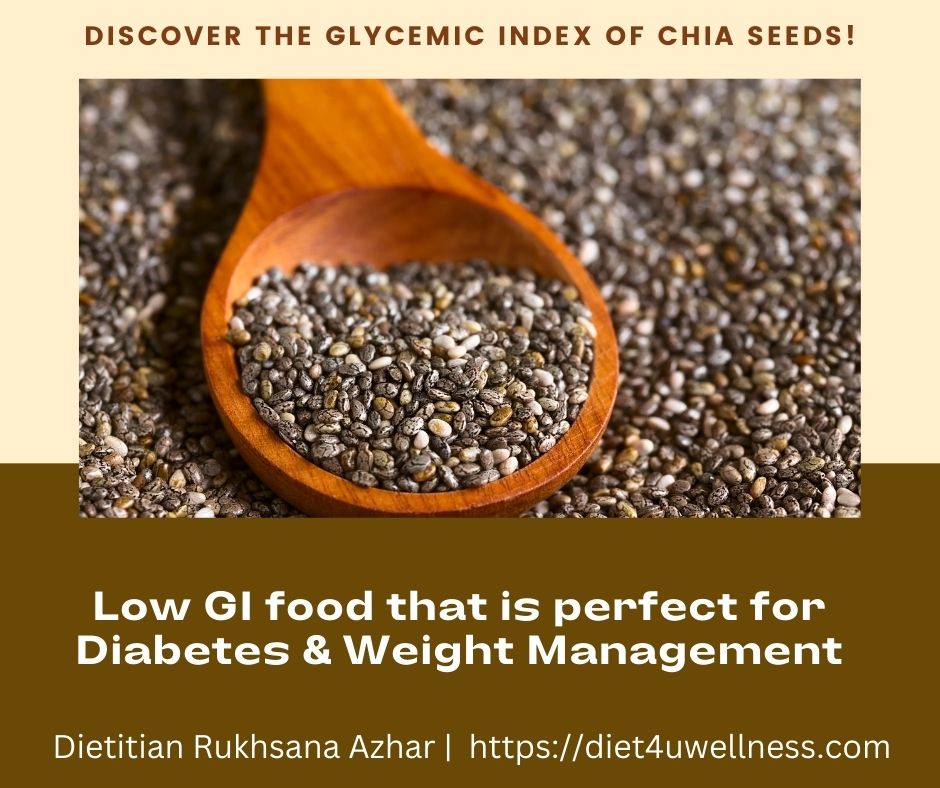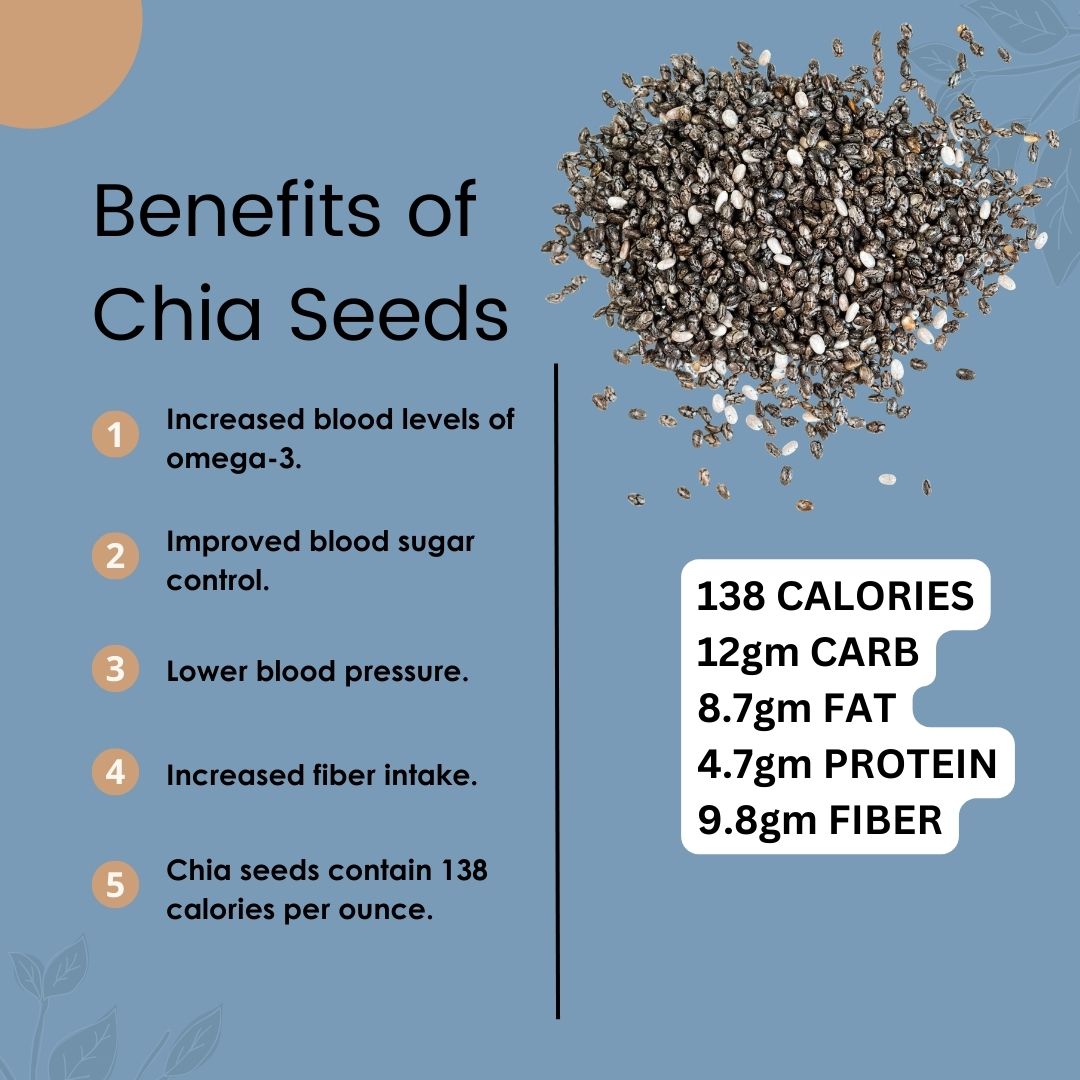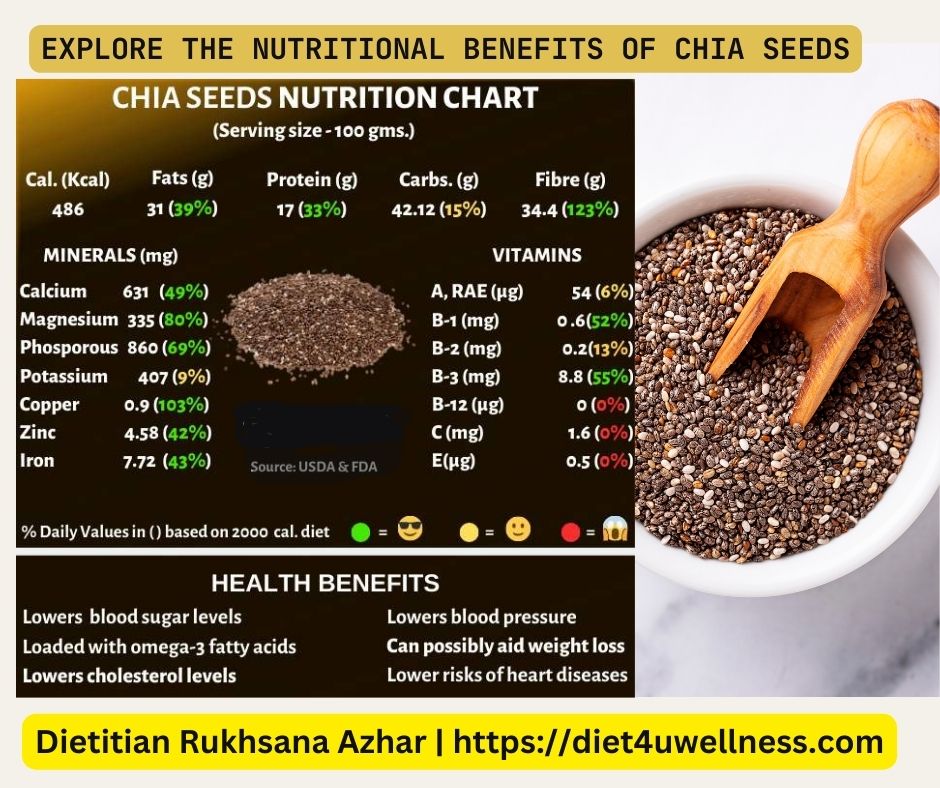
Understanding the Glycemic Index of Chia Seeds: Health Benefits and Uses
Table of Contents
- 1 Understanding the Glycemic Index of Chia Seeds: Health Benefits and Uses
- 1.1 Exploring the Glycemic Index of Chia Seeds
- 1.2 Chia Seeds and Glycemic Index
- 1.2.1 Introduction to Chia Seeds
- 1.2.2 Glycemic Index of Chia Seeds
- 1.2.3 Factors Influencing the Glycemic Index of Chia Seeds
- 1.2.4 Exploring the Nutritional Benefits of Low GI Chia Seeds
- 1.2.5 Integrating Chia Seeds into your diet
- 1.2.6 Benefits of Chia Seeds in Diabetes Management
- 1.2.7 Benefits of Chia Seeds in Weight Loss
- 1.3 FAQs
In the world of healthy eating, knowing how to calculate the glycemic value (GI) of food items is essential for making educated decisions about your diet. Chia seeds, a high-nutrient superfood that is becoming popular due to their health benefits as well as an glycemic index that is worth examining. This article delved into the intricate details of the Glycemic Index of Chia seeds, providing a better understanding of the implications for your health and well-being.
Exploring the Glycemic Index of Chia Seeds
What is the Glycemic Index of Chia Seeds ?
The Glycemic index is a measure that ranges from 0 to 100 which indicates the speed at which carbohydrates in food increase blood sugar levels as in comparison to pure glucose which has an GI hundred. Foods that have high GI are quickly digested and absorbed, resulting in high blood sugar levels. On the other hand, those with a lower GI are absorbed more slowly which results in gradual increases in blood sugar.
Significance of Glycemic Index
Knowing the glycemic index of food items is vital for people who have the condition or trying to maintain the blood sugar level. Foods that have low GI tend to provide long-lasting energy levels, increase eating well, and promote general health, lowering chance of developing chronic illnesses like type 2 heart disease and diabetes.
Chia Seeds and Glycemic Index
Introduction to Chia Seeds
Chia seeds, which are derived of Salvia hispanica, also known as Salvia hispanica plant are tiny but powerful sources of nutrients. Filled with protein, fiber as well as nutritious fats, vitamins as well as minerals. These small seeds offer a remarkable nutritional profile, which makes them a sought-after ingredient in many dishes and diets.
Glycemic Index of Chia Seeds
Despite their high carbohydrate content Chia seeds are extremely low glycemic Index. With an GI usually between 1 and 10, chia seeds are regarded as to be a food with a low GI. They’re digested slowly, which results in an infrequent release of glucose into the bloodstream. This provides constant energy without creating rapid rises of blood sugar.
Factors Influencing the Glycemic Index of Chia Seeds
The Glycemic Index (GI) of food items is affected by a variety of aspects, such as the composition of their ingredients, how they are processed and methods of preparation. Chia seeds, although high in carbohydrates, possess an extremely low glycemic score due to a variety of factors:

- fiber content Chia seeds are high in fiber from the diet, including an abundance of fiber that is insoluble. Fiber can slow down digesting and absorption process of carbs, which results in the gradually release of glucose into bloodstream and thereby decreasing the Glycemic Response.
- Carbohydrate Composition Chia seeds are mostly complex carbohydrates, including the fiber and mucilage. Complex carbohydrates are digested slower as compared to simple carbs, which results in lower glycemic levels.
- Gel Formation The process occurs when Chia seeds are exposed fluids or water they develop into gel-like substances due to their mucilage-rich content. The formation of gels further reduces metabolism and digestion of carbs which results in lower glycemic index.
- The Fat Content Chia seeds can also be rich of healthy fats specifically omega-3 fats. Consuming fat with carbohydrates may help reduce the glycemic index of food through slowing the process of emptying gastric juices and slowing the absorption of carbohydrates.
- Processing: How chia seeds are processed could alter their glycemic index. Chia seeds that are whole are lower in glycemic value when compared to milled or ground chia seeds. This is because grinding them can increase their surface area. This can cause faster digestion and the absorption of carbohydrates.
- Combination with other Foods: Chia seeds can be affected by the food they’re consumed with. Chia seeds when paired with food items that fall lower on the scale of glycemic index like proteins or vegetables, can aid in reducing the overall glycemic impact of an entire meal.
- Techniques for Cooking: Cooking chia seeds can change their glycemic level compared to eating them uncooked. However, because of the fact that they form gels when cooked the chia seeds have a less glycemic index.
Exploring the Nutritional Benefits of Low GI Chia Seeds

Low GI Chia seeds are well-known for their incredible nutritional profile. They are loaded with a variety of vitamins, minerals and antioxidants that can help improve the overall wellbeing. Here are some important nutrients you can find in these tiny energy sources
Omega-3 Fatty Acids:
Chia seed is among the highest sources of omega-3 fats. They are vital nutrients that are recognized for their anti-inflammatory properties and their contribution to the health of the brain.
Enhancing Heart Health:
These omega-3 fats which are present in Chia seeds play an important function in reducing inflammation and improving your health and the condition of your heart. Chia seeds included in your diet plan can lower cholesterol levels and decrease the likelihood of developing heart-related diseases.
Fiber:
Chia seeds make an excellent source of fiber just one ounce supplying a substantial portion of your daily suggested. Fiber is important for digestion, improving regularity, and preventing constipation.
Aiding in Weight Loss:
Chia seeds a rich source of fiber which will help you feel more full for a longer period of time, and also reduce the overall calories consumed, thereby aiding in losing weight. In addition the gel-like consistency that occurs when chia seeds are submerged in liquid may further enhance feelings of being full.
Protein:
Despite their size, Chia seeds are surprisingly high in protein, making them an ideal addition to vegetarian and vegan eating habits. Protein is essential for development and repair of muscles and overall level of energy.
Supporting Muscle Health:
For those who are athletes or simply want to build strength and size, Chia seed may be an ideal general-purpose supplement. The high protein content in Chia seeds is a great source of elements needed for repairing and recovering muscles.
Antioxidants:
Chia seeds are packed with antioxidants. They’re compounds that assist help neutralize harmful free radicals, and also guard against the negative effects of the oxidative stress. Antioxidants play a vital role in reducing the risk of chronic illnesses and slowing the ageing process.
Promoting Skin Health:
Chia seeds could do wonders for your skin and help fight wrinkles and enhance facial appearance. Chia seeds are a healthy addition to your diet and can produce younger, more radiant skin.
Vitamins and Minerals:
Together with omega-3 essential fatty acids, as well as protein, fiber as well as antioxidants, Chia seeds are stuffed with vitamins and minerals such as calcium, magnesium and Phosphorus, the mineral.
Bone Health:
Calcium, as together with the minerals magnesium and phosphorus, are vital to keep bone health and strength. Incorporating chia seeds in your diet, you can help prevent osteoporosis as well as other bone-related illnesses.
Integrating Chia Seeds into your diet
After you’ve learned your Glycemic Index for Chia seeds and the benefits of eating food items with a low GI, we can look at ways to incorporate these nutritious seeds into food.
Chia Seed Pudding
- Enjoy a energizing and tasty breakfast or snack with Chia Seed Pudding. Simply mix Chia seeds with milk you prefer along with sweeteners, flavorings, sweeteners and sweeteners. After that, it can remain for a while in the refrigerator to create the perfect dessert that is smooth and satiating.
Smoothie Booster
- Improve the nutrition value of your drink of choice by adding the teaspoon of Chia seeds. They’ll not just give you the slight crunch that you like and will also provide protein, fiber, and healthy fats to keep you full and healthy.
Baking Ingredient
- Create baked goods that are healthier by giving them a healthy treatment by including Chia seeds into muffins and bread, and also biscuits. Chia seeds act as an adhesive and give your baked goods an extra nutritional boost, but without altering the taste and texture.
Benefits of Chia Seeds in Diabetes Management
Controlling your blood sugar levels is essential for people with diabetes to avoid any complications and protect overall well-being. Incorporating chia seeds into your diet can bring many benefits to controlling diabetes.
Regulation of Blood Sugar Levels
Due to the moderate GI and high level of fibre Chia seeds can help regulate the blood sugar levels through reducing glucose absorption into the bloodstream. This will prevent the development of crashes and spikes in blood sugar levels and promote an improved glycemic control.
Enhanced Insulin Sensitivity
Research suggests Chia seeds may improve the insulin sensitivity of cells, making them more adept at adapting to insulin and utilize glucose as fuel for their body. Through increasing insulin sensitivity, Chia seeds can aid in reducing blood sugar levels in those suffering from diabetes.
Heart Health Support
Diabetes sufferers are more prone to developing cardiovascular diseases. Chia seeds contain omega-3 fatty acids, which are healthy for the heart, which can help reduce inflammation, lower cholesterol levels, and improve the health of your cardiovascular system, which will lower the risk of heart-related issues that can be caused by diabetes.
Benefits of Chia Seeds in Weight Loss
In addition to their value in managing diabetes, Chia seeds could also prove beneficial for those looking to lose weight. Chia seeds have a unique nutritional profile that provides many advantages to weight loss as well as promoting overall health.
Satiety and Appetite Control
Despite their small size, Chia seeds are stuffed with fiber, and may aid in increasing the feeling of fullness and satisfaction. Through expanding the stomach and the absorption of water, chia seeds reduce appetite and decrease calories consumed. This makes them a beneficial aid in weight loss efforts.
Regulation of Blood Sugar Levels
A stable glucose level in the blood is crucial to ensure energy levels are maintained and ward off cravings for sweet or high-calorie food items. Chia seeds are able to slow down metabolism and absorption of carbs helps in preventing blood sugar levels that are high and also reduce cravings and helping lower weight.
Nutrient Density
Chia seeds abundant in nutrients. This are to say, they supply many essential vitamins, minerals as well as antioxidants that need just some calories. By incorporating Chia seeds into the diet of a balanced one, you will to ensure that you get enough nutrients and help in achieving the weight loss goals.
FAQs
Chia seeds are suitable for diabetics?
Chia seeds have low glycemic indexes. They can also aid in controlling the blood sugar levels and make them a great food choice for those suffering from diabetes.
What could chia seeds do to aid to lose fat?
Chia seeds improve the appetite and regulate blood sugar levels. They are high in nutritional value that makes them effective for weight loss, through decreasing appetite and improving general health.
Chia seeds can be consumed in their raw shape?
Chia seeds can be eaten in their raw form, and can be sprinkled on yogurt, oatmeal, or salads. They can also be used by mixing the seeds into baked items.
What is the recommended quantity of Chia seeds?
The recommended daily intake for Chia seeds are 2 teaspoons. They are easily incorporated in a variety of meals and beverages.
Do you know of negative consequences that might be caused by the consumption of Chia seeds?
Chia seeds can generally be regarded to be safe to eat however some individuals may experience digestive discomfort and reaction to food allergies. It is advised to start by eating tiny amounts then gradually increase the consumption, while watching for any reactions that might be adverse.
Chia seeds may be a good substitute for meals to help you lose pounds?
Chia seeds have benefits for health, but they should not be used as a substitute for healthy food items. Instead, they should be utilized in conjunction with an appropriate diet plan in order to assist in weight loss objectives.
What is the way that Chia seeds improve your heart health?
Chia seeds full of omega-3 fats, which have been shown to boost heart health by decreasing inflammation and lowering the levels of cholesterol.
Conclusion
Chia seeds in your diet may provide many advantages, especially for those who are suffering from weight gain or diabetes. excess weight. Because of their low glycemic scores and their rich content of fiber and an abundance of essential nutrients, chia seeds are a versatile and nutritious ingredient to include to your food. In understanding their role in the control the blood sugar ranges as well as weight control in Delhi, people are able to benefit from the power of chia seeds in improving overall health and wellbeing.

Hello My Name is Dt. Ruksana Azhar and I am a certified dietician and providing online & offline services for Weight Management, PCOS/PCOD Management, Diabetes Management , etc. I have 12+ years of experience in the Apollo Hospital Delhi , Max Super Specialty Hospital Delhi, Lilavati Hospital Mumbai and VLCC healthcare Mumbai. I loves to write healthcare and lifestyle related blog. My favorite part of being a doctor is the opportunity to directly improve the health and wellbeing of my patients and to develop professional and personal relationships with them.



